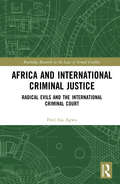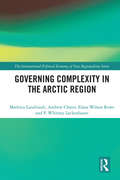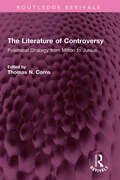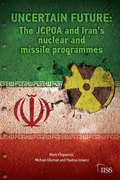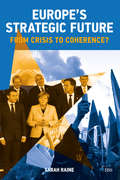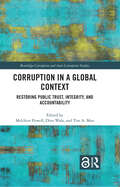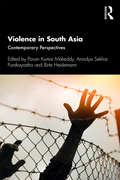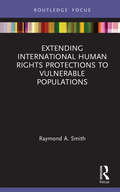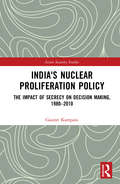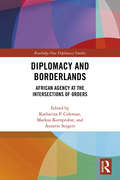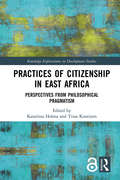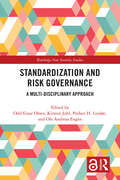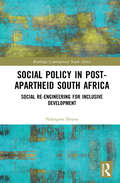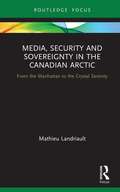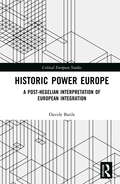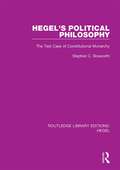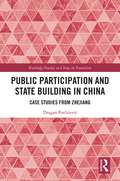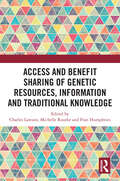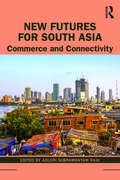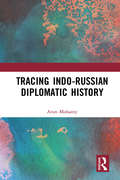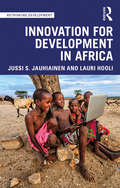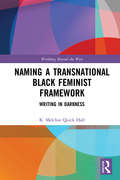- Table View
- List View
Africa and International Criminal Justice: Radical Evils and the International Criminal Court (Routledge Research in the Law of Armed Conflict)
by Fred Aja AgwuThis book provides an overview of crimes under international law, radical evils, in a number of African states. This overview informs a critical analysis of the debates surrounding the African Union’s call for withdrawal from the International Criminal Court and proposes a way forward with a more pertinent role for the Court. The work critically analyzes the arguments around withdrawal from the ICC and the extension of the jurisdiction of the African Court into criminal matters. It is held that this was not intended in the spirit of complementarity as envisaged by the Rome Statute, and is subject to political calculation and manipulation by national governments. Recasting the ICC as a court of second instance would provide a stronger institutional and jurisdictional regime. The book will be a valuable resource for students, academics, and policymakers working in the areas of international humanitarian law, international criminal law, African studies, and genocide studies.
Governing Complexity in the Arctic Region (The International Political Economy of New Regionalisms Series)
by Mathieu Landriault Andrew Chater Elana Wilson Rowe P. Whitney LackenbauerThis book examines emerging forms of governance in the Arctic region, exploring how different types of state and non-state actors promote and support rules and standards. The authors argue that confining our understandings of Arctic governance to Arctic states and a focus on the Arctic Council as the primary site of circumpolar governance provides an incomplete picture. Instead, they embrace the complexity of governance in the Arctic by systematically analyzing and comparing the position, interventions, and influence of different actor groups seeking to shape Arctic political and economic outcomes in multiple sites of Arctic politics, both formal and informal.This book assesses the potential that sub-national governments, corporations, civil society organizations, Indigenous peoples and non-Arctic states possess to develop norms and standards to ensure a stable, rule-based Arctic region. It will be of interest to all scholars and students working in the fields of Arctic Sovereignty, Security Studies, Global Governance and International Political Economy.
The Literature of Controversy: Polemical Strategy from Milton to Junius (Routledge Revivals)
by Thomas N. CornsFirst published in 1987, The Literature of Controversy is a collection of essays by scholars from Britain, the United States, and Australia on major works from a classic epoch of English controversial prose. Each essay engages a single text or series of texts, less to discuss the ideas and arguments per se than to consider the rhetorical techniques assumed for the political manipulation of the readers. Though emphasis varies from contribution to contribution, the purpose, broadly, is to explore how the constituents of those texts are organised to coax, cajole, persuade or inspire those to whom they address. As the editor argues in his introduction, this approach, the critique of polemical strategy, for the most part accepts the validity of paying regard to the author and his intentions; it engages questions about the responses of the readership at which the texts were targeted; and it proceeds intertextuality in its attempts to reconstruct the controversies in which the texts were embedded and the codes within which they operated. This book will be of interest to students of literature, rhetoric and history.
Uncertain Future: The JCPOA and Iran’s Nuclear and Missile Programmes (Adelphi series)
by Mark FitzpatrickIn July 2015, eight parties – France, Germany and the United Kingdom, together with the European Union and China, Russia and the United States on the one side, and Iran on the other – adopted the Joint Comprehensive Plan of Action (JCPOA), better known as the Iran nuclear deal. Under the agreement, Iran accepted limits to its nuclear programme in return for sanctions relief. Hailed by some as a diplomatic achievement, detractors – both in the US and the Middle East – saw the deal as overly lenient. In May 2018, US President Donald Trump announced that the US would cease waiving sanctions and withdraw from the agreement. This Adelphi book assesses that Trump’s decision was a grave error. Like any multilateral agreement, the deal was not perfect, but Iran had been honouring its commitments. Drawing on a deep understanding of the non-proliferation regime and technical expertise, the authors trace the emergence of antipathy to the JCPOA and set out how many of the politicised criticisms of the accord are demonstrably incorrect. They argue that the little-known Procurement Channel – established by the JCPOA to give Iran a legitimate route to procure goods and services for its now-limited nuclear programme – has been an effective check on Iran’s illicit procurement of nuclear-related goods. Moreover, this book demonstrates that Iran’s nuclear and ballistic-missile programmes are not intrinsically linked, as not all Iranian missiles are designed to be nuclear-capable. While the deal endures for now, its survival will ultimately depend on Iran.
Europe's Strategic Future: From Crisis to Coherence? (Adelphi series)
by Sarah RaineEurope has suffered a decade of crises, with sovereign-debt troubles leading to austerity policies that exacerbated divisions inside member states and between them. Thereafter the Union was confronted with the challenges posed by a revanchist Russia in Ukraine and by a surge in migration from the Middle East and other conflict zones. The June 2016 UK vote to leave the Union threatened further damage to an institution that acknowledges it has failed to punch its weight in the spheres of foreign, defence and security policy. While that is a chronic shortcoming, its impact is becoming more acute as economic power moves East and Europe can no longer count on the steadfast support and leadership of the United States. The costs of Europe’s failure to achieve strategic coherence and effect are steadily rising. This Adelphi book addresses the consequences of Europe’s multiple crises for its standing as a strategic actor, acknowledging its unique character and capabilities. It argues that strategic thought and action is belatedly being informed by the deteriorating security environment, and that nascent initiatives have the potential to effect a step-change. There are grounds for cautious optimism, visible in the success of stabilisation and counter-piracy operations as well as coordinated diplomatic activity. Also, the continent’s leading powers are becoming more pragmatic about how cooperation is organised within and beyond the Union. These developments offer the possibility that Europe might meet its aspirations to be a strategic actor of consequence, despite a long-track record of disappointment and the still-considerable obstacles that lie in its path.
Corruption in a Global Context: Restoring Public Trust, Integrity, and Accountability (Routledge Corruption and Anti-Corruption Studies)
by Tim A. Mau Melchior Powell Dina WafaThis book provides an important survey of the causes and current state of corruption across a range of nations and regions. Delving into the diverse ways in which corruption is being combatted, the book explores and describes efforts to inculcate principles of ethical conduct in citizens, private sector actors and public sector personnel and institutions. Corruption is a global condition that effects every type of government, at every level, and has bewitched scholars of governance from ancient times to the present day. The book brings together chapters on a range of state and regional corruption experiences, framing them in terms of efforts to enhance ethical conduct and achieve integrity in government practices and operations. In addition, the book addresses and analyses the theoretical and practical bases of ethics that form the background and historical precepts of efforts to create integrity in government practices, and finally assesses recent international efforts to address corruption on an international scale. This book will be perfect for researchers and upper level students of public administration, comparative government, international development, criminal justice, and corruption.
Violence in South Asia: Contemporary Perspectives
by Pavan Kumar Malreddy Anindya Sekhar Purakayastha Birte HeidemannThis volume explores new perspectives on contemporary forms of violence in South Asia. Drawing on extensive fieldwork and case studies, it examines the infiltration of violence at the societal level and affords a comparative regional analysis of its historical, cultural and geopolitical origins in South Asia. Featuring essays from Sri Lanka to Nepal, and from Afghanistan to Burma, it sheds light on issues as wide-ranging as lynching and mob justice, hate speech, caste violence, gender-based violence and the plight of the Rohingyas, among others. Lucid and engaging, this book will be an invaluable source of reference as well as scholarship to students and researchers of postcolonial studies, anthropology, sociology, cultural geography, minority studies, politics and gender studies.
The EU in Association Agreement Negotiations: Challenges to Complex Policy Coordination (Routledge Advances in European Politics)
by Daniel SchadeThrough its focus on EU Association Agreement negotiations, this book goes beyond the study of traditional EU trade negotiations and puts the spotlight on the increasing number of negotiations where trade relations are discussed alongside political ones. This setting makes both the negotiations themselves and the definition of the EU’s positions more complicated, raising the question as to what ultimately determines the EU’s behaviour in such complex negotiations spanning multiple of the EU’s policy areas. Offering a generalizable analytical model to study such complex EU international negotiations, the book illuminates the preferences and interactions between individual parts of the EU’s foreign affairs bureaucracy, and those between the lead actors, the Directorate General for Trade, and the European External Action Service (EEAS), in particular. In doing so, it demonstrates the utility of adapting the concept of bureaucratic politics from Foreign Policy Analysis (FPA) to the EU’s foreign policy decision-making apparatus across different stages of EU international negotiations. It also discusses how the institutional changes of the Treaty of Lisbon have altered the institutional set-up of the EU’s foreign affairs bureaucracy and thereby changed the foundations of the EU’s bureaucratic politics. Finally, the book finds that the EU’s behaviour in these negotiations is ultimately shaped, on the one hand, by the presence of diverging positions between its institutional actors, and the difficulty to bridge them through policy coordination mechanisms, on the other. Empirically, it explores these dynamics by considering the EU’s Association Agreement negotiations on the Latin American continent over the last twenty years before demonstrating the analytical model’s utility in the context of the EU’s negotiations with Ukraine and Japan. This book will be of key interest to scholars, students, and practitioners in EU foreign affairs/external relations, EU public administration and public policy, EU trade policy, and more broadly to Foreign Policy Analysis and International Relations.
Extending International Human Rights Protections to Vulnerable Populations (Routledge Studies in Human Rights)
by Raymond A. SmithThis book inductively develops a new typology that identifies and evaluates three principal strategies that have been, and are being, used to extend international human rights protections to new categories of vulnerable populations. The book explicates the evolution and ongoing utility of the three strategies: categorical enlargement, conceptual expansion, and group-conscious universal application. The strategies are elucidated by case studies of nine distinct vulnerable populations: national minorities; those oppressed on the basis of caste; people with albinism; cross-cultural migrants; members of the African diaspora; Roma/Gypsies; persons affected by leprosy; older individuals; and lesbian, gay, bisexual, and transgender (LGBT) people. The book concludes by considering the utility of the three strategies for emerging vulnerable populations. It encourages discourse about the protection of vulnerable populations to move beyond a stale fixation on the texts of treaties and towards a more proactive normative framework that prioritizes the lived experiences of human beings. Extending International Human Rights Protections to Vulnerable Populations will be of key interest to students and scholars of international human rights, to social justice advocates, to human rights practitioners, and to those working with oppressed groups, human rights law, and international relations.
Violence from Slavery to #BlackLivesMatter: African American History and Representation
by Andrew Dix Peter TempletonViolence from Slavery to #BlackLivesMatter brings together perspectives on violence and its representation in African American history from slavery to the present moment. Contributors explore how violence, signifying both an instrument of the white majority’s power and a modality of black resistance, has been understood and articulated in primary materials that range from slave narrative through "lynching plays" and Richard Wright’s fiction to contemporary activist poetry, and from photography of African American suffering through Blaxploitation cinema and Spike Lee’s films to rap lyrics and performances. Diverse both in their period coverage and their choice of medium for discussion, the 11 essays are unified by a shared concern to unpack violence’s multiple meanings for black America. Underlying the collection, too, is not only the desire to memorialize past moments of black American suffering and resistance, but, in politically timely fashion, to explore their connections to our current conjuncture.
India's Nuclear Proliferation Policy: The Impact of Secrecy on Decision Making, 1980–2010 (Asian Security Studies)
by Gaurav KampaniThis book examines India’s nuclear program, and it shows how secrecy inhibits learning in states and corrodes the capacity of decision-makers to generate optimal policy choices. Focusing on clandestine Indian nuclear proliferation during 1980–2010, the book argues that efficient decision-making is dependent on strongly established knowledge actors, high information turnover and the capacity of leaders to effectively monitor their agents. When secrecy concerns prevent states from institutionalizing these processes, leaders tend to rely more on heuristics and less on rational thought processes in choices involving matters of great political uncertainty and technical complexity. Conversely, decision-making improves as secrecy declines and policy choices become subject to higher levels of scrutiny and contestation. The arguments in this book draw on compelling evidence gathered from interviews conducted by the author, with interviewees including individuals who were involved in nuclear planning in India from 1980 to 2010, such as former cabinet and defence secretaries, the principal secretary to the prime minister, national security advisors, secretaries to the department of atomic energy, military chiefs of staff and their principal staff officers, and commanders of India’s strategic (nuclear) forces. This book will be of much interest to students of nuclear proliferation, Asian politics, strategic studies and International Relations.
Diplomacy and Borderlands: African Agency at the Intersections of Orders (Routledge New Diplomacy Studies)
by Katharina P. Coleman Markus Kornprobst Annette SeegersThis book examines Africa’s internal and external relations by focusing on three core concepts: orders, diplomacy and borderlands. The contributors examine traditional and non-traditional diplomatic actors, and domestic, regional, continental, and global orders. They argue that African diplomats profoundly shape these orders by situating themselves within in-between-spaces of geographical and functional orders. It is in these borderlands that agency, despite all kinds of constraints, flourishes. Chapters in the book compare domestic orders to regional ones, and then continental African orders to global ones. They deal with a range of functional orders, including development, international trade, human rights, migration, nuclear arms control, peacekeeping, public administration, and territorial change. By focusing on these topics, the volume contributes to a better understanding of African international relations, sharpens analyses of ordering processes in world politics, and adds to our comprehension of how diplomacy shapes orders and vice versa. The studies collected here show a much more nuanced picture of African agency in African and international affairs and suggest that African diplomacy is far more extensive than is often assumed. This book will be of much interest to students of diplomacy studies, African politics and International Relations.
Practices of Citizenship in East Africa: Perspectives from Philosophical Pragmatism (Routledge Explorations in Development Studies)
by Tiina Kontinen Katariina HolmaPractices of Citizenship in East Africa uses insights from philosophical pragmatism to explore how to strengthen citizenship within developing countries. Using a bottom-up approach, the book investigates the various everyday practices in which citizenship habits are formed and reformulated. In particular, the book reflects on the challenges of implementing the ideals of transformative and critical learning in the attempts to promote active citizenship. Drawing on extensive empirical research from rural Uganda and Tanzania and bringing forward the voices of African researchers and academics, the book highlights the importance of context in defining how habits and practices of citizenship are constructed and understood within communities. The book demonstrates how conceptualizations derived from philosophical pragmatism facilitate identification of the dynamics of incremental change in citizenship. It also provides a definition of learning as reformulation of habits, which helps to understand the difficulties in promoting change. This book will be of interest to scholars within the fields of development, governance, and educational philosophy. Practitioners and policy-makers working on inclusive citizenship and interventions to strengthen civil society will also find the concepts explored in this book useful to their work.
Routledge Handbook of European Welfare Systems (Routledge International Handbooks)
by Sonja Blum Johanna Kuhlmann Klaus SchubertPublished ten years after the first edition, this new Handbook offers topical, and comprehensive information on the welfare systems of all 28 EU member states and their recent reforms, giving the reader an invaluable introduction and basis for comparative welfare research. Additional chapters provide detailed information on EU social policy, as well as comparative analyses of European welfare systems and their reform pathways. For this second edition, all chapters have been updated and substantially revised, and Croatia additionally included. The second edition of this Handbook is most timely, given the often-fundamental welfare state transformations against the background of the financial and economic crises, transforming social policy ideas, as well as political shifts in a number of European countries. The book sets out to analyse these new developments when it comes to social policy. In the first part, all country chapters provide systematic and comparable information on the foundations of the different national welfare systems and their characteristics. In the second part, using a joint conceptual foundation, they focus on policy changes (especially of the last two decades) in different social policy areas, including old-age, labour market, family, healthcare, and social assistance policies. As the comparative chapters conclude, European welfare system landscapes have been in constant motion in the last two decades. While austerity is not to be seen on the aggregate level, the in-depth country studies show that all policy sectors have been characterised by different reform directions and ideas. The findings not only reveal both change and continuity, but also policy reversal as a distinct type that characterises social policy reform. The book provides a rich resource to the international welfare state research community, and is also useful for social policy teaching.
Standardization and Risk Governance: A Multi-Disciplinary Approach (Routledge New Security Studies)
by Ole Andreas Engen Odd Einar Olsen Kirsten Voigt Juhl Preben LindøeThis multi-disciplinary book conceptualises, maps and analyses ongoing standardisation processes of risk issues across various sectors, processes and practices. Standards are not only technical specifications and guidelines to support efficient risk governance, but also contain social, political, economic and organizational aspects. This book presents a variety of standardization processes and applications of standards that may influence our judgements of risk, the organizing of risk governance, and accordingly our ways of behaviour. Standardization and standards can impact risk governance in different ways. The most important lessons drawn from the present volume can be summarized under three areas: (a) how standardization might impact on power relations and interests; (b) how standardization may change flexibility in decision-making, communication, and cooperation; and (c) how standardization could (re)direct attention and risk perception. The volume’s purpose is to present an analysis of standardisation processes and how it impacts on our thinking about risk, how we organise risk governance and how standardisation may influence on risk management. In so doing, it contributes to a more informed discourse regarding the use of standards and standardisation in contemporary risk management. This book will be of much interest to students of risk, standardisation, global governance and critical security studies.
Social Policy in Post-Apartheid South Africa: Social Re-engineering for Inclusive Development (Routledge Contemporary South Africa)
by Ndangwa NoyooThis book critically examines the current social policy in post-apartheid South Africa and proposes an alternative social policy agenda to create a new development pathway for the country. Taking social policy as a vehicle that will facilitate the creation of a new society altogether, namely the "Good Society," the author argues for the adoption of policy that will socially re-engineer South Africa. The author shows how the policy tools and development interventions which were undertaken by the post-apartheid state in driving South Africa’s transformation agenda failed to emancipate many individuals, families, and communities from the cycle of intergenerational poverty and underdevelopment. He contends that social policy interventions that foster the social re-engineering of South African society must take place to untangle the inherited colonial-apartheid social order. This book includes comparative analyses on the Global South and Global North to present the ways in which countries such as post-Second World War Great Britain and Sweden, and post-independence Zambia of the 1960s and 1970s, were able to use social policy to create new societies altogether or places similar to the "Good Society." The conceptual and methodological issues that form the basis for this book reside in public policy-making and the public good and will be of interest to scholars of social policy, social development, and South African society.
Media, Security and Sovereignty in the Canadian Arctic: From the Manhattan to the Crystal Serenity
by Mathieu LandriaultThis book documents how the Arctic region has been represented in the media: exploring how the media has framed the Arctic and whether this has an impact on governmental decision-making and public preferences. The Arctic region faces profound transformations, due to global warming, spurring intense debates about economic growth, environmental protection, and socio-cultural development. At the same time, most of humanity will never come face-to-face with the realities of the region: the media represents our only opportunity to learn about what this evolving region stands for. Recognizing that media coverage will tend to focus on specific events and relay specific messages, this book scrutinizes the nature of these messages to figure out how the Arctic region is presented by different media outlets. Studying different types of media, Landriault conducts an analysis of 628 newspaper articles, 110 televised reports, 9 magazine articles, and 404 tweets to provide the first systematic and rigorous study of Arctic media representations. This book will interest scholars, practitioners, and students in Arctic studies, critical geography, political science, and communication studies.
Historic Power Europe: A Post-Hegelian Interpretation of European Integration (Critical European Studies)
by Davide BarileThis book proposes a new theoretical framework to move beyond the traditional tenets of modern international relations theory to investigate European integration and shed light on current events. Based on contemporary analyses, Hegel’s political philosophy, and the fundamental role of historical interpretation, this book addresses the institutional dynamics as well as the discursive practices behind both the Eastern enlargement and the current critical situation. Looking back in particular at European integration in one of its most significant events, namely the enlargement of the European Union to include former Socialist countries, it offers a unique conceptualisation of the nature and limits of European integration and for understanding the current crisis between Brussels and the Visegrád countries, 30 years since the revolutions of 1989. This book will be of key interest to scholars and students of European integration, European politics and history, and political theory and philosophy.
Hegel's Political Philosophy: The Test Case of Constitutional Monarchy
by Stephen C. BosworthOriginally published in 1991, this volume examines Hegel’s political philosophy from the perspective of his argument for constitutional monarchy. It offers an interpretation of Hegelian theory that is relevant for the understanding of modern republican constitutions. Modern republican theories are assessed together with those of Plato, Kant and Marx in order to put Hegel’s model to the most rigorous test. The arguments are based on fresh analysis of Hegel’s system and on new translations of key passages in Hegel’s text.
Public Participation and State Building in China: Case Studies from Zhejiang (Routledge Studies on China in Transition)
by Dragan PavlićevićThis book explores non-electoral means of public participation in contemporary China, both as an outcome of and a key contributor to the party-state’s efforts to improve its governing capacity. Examining consultative meetings, public hearings, and the use of surveys and questionnaires in Zhejiang province, on an empirical level, the study evaluates the historical development and institutional backgrounds of these mechanisms, as well as provides a critical assessment of their achievements and failures. At the same time, on a theoretical level, this book contributes to the broader scholarship on contemporary Chinese politics and political development within one-party regimes, as well as debates about state building and democratisation. Relying on the distinction between access to and exercise of power, it concludes that non-electoral public participation is in fact a function of state building. Developing a state capable of producing effective solutions to governing challenges, it is argued, requires public participation in the governing process. With analysis informed by interviews with local-level policy-makers and officials, academics, and citizens’ representatives and activists, Public Participation and State Building in China will be a valuable research resource for students and scholars of Chinese politics, political science, and civil society.
Access and Benefit Sharing of Genetic Resources, Information and Traditional Knowledge
by Charles Lawson, Michelle Rourke and Fran HumphriesAddressing the management of genetic resources, this book offers a new assessment of the contemporary Access and Benefit Sharing (ABS) regime. Debates about ABS have moved on. The initial focus on the legal obligations established by international agreements like the United Nations Convention on Biological Diversity and the form of obligations for collecting physical biological materials have now shifted into a far more complex series of disputes and challenges about the ways ABS should be implemented and enforced. These now cover a wide range of issues, including: digital sequence information, the repatriation of resources, technology transfer, traditional knowledge and cultural expressions, open access to information and knowledge, naming conventions, farmers’ rights, new schemes for accessing pandemic viruses sharing DNA sequences, and so on. Drawing together perspectives from an interdisciplinary range of leading and emerging international scholars, this book offers a new approach to the ABS landscape; as it breaks from the standard regulatory analyses in order to explore alternative solutions to the intractable issues for the Access and Benefit Sharing of genetic resources. Addressing these modern legal debates from a perspective that will appeal to both ABS scholars and those with broader legal concerns in the areas of intellectual property, food, governance, Indigenous issues, and so on, this book will be a useful resource for scholars and students as well as those in government and in international institutions working in relevant areas.
New Futures for South Asia: Commerce and Connectivity
by Adluri Subramanyam RajuThis book is a comprehensive examination of the society, polity and economy of South Asian countries and their future trajectories. The chapters included in the volume present key insights into the geopolitical dynamics of the region. New Futures for South Asia: draws on case studies from the region to discuss how democracy has fared in terms of state-society linkages, transformational possibilities and the globalization and radicalization of politics; studies possibilities of economic cooperation in South Asia, including common currency, regional imbalances and aid, transport connectivity and electricity consumption; examines the crucial role of SAARC and bilateralism in forging connectivities across the diverse geographies of the region. A major intervention in re-shaping South Asian studies, this book will be a great resource for scholars and researchers of security studies, strategic affairs, international relations, development studies and politics.
Tracing Indo-Russian Diplomatic History
by Arun MohantyThe India-Russia relationship has been through a number of phases since its formal establishment in April 1947. Prime Minister Nehru’s strategic vision led him to seek diplomatic relations with the Soviet Union (USSR) even before India attained Independence. The enthusiastic Soviet response launched a relationship which has had some unique features in the past seventy-two years. The detailed history of the India-Russia relationship presented in this volume highlights the continued relevance of many of the factors that led to a close India-Russia bonding, even while identifying the slip roads into which the partnership has occasionally drifted. Politics evolves continuously, but geography remains constant. The India-Russia relationship has a mutually-recognized geopolitical logic. They have common concerns in the shared neighbourhood of West and Central Asia. Like India, Russia has had a complex relationship with China. In the quest for a multi-polar world, in which every pole seeks to protect its core interests and promote its aspirations, Russia and India, as this comprehensive volume notes, will remain staunch partners in the foreseeable future. Please note: Taylor & Francis does not sell or distribute the Hardback in India, Pakistan, Nepal, Bhutan, Bangladesh and Sri Lanka
Innovation for Development in Africa (Rethinking Development)
by Jussi S. Jauhiainen Lauri HooliThis book uncovers the many ways in which innovations and innovation system development policies have become crucial to development policy formation across Africa. As new instruments, actors and tools emerge in development cooperation, the role of innovation in the societal development of developing countries needs to be addressed fully. This book delves into subjects as diverse as the changing development policies between the Global North and South, the role of innovation in international aid and development policies, the role of public, private and non-governmental sectors, universities and other development actors, and the potential for inclusive innovation in local communities. In particular, the book asks who benefits from innovation-focussed development policies, and if and how practical innovation instruments include the global poor. Written in an accessible and engaging style, the book includes a range of discussion questions and further reading suggestions to suit a range of readers, from students right through to policy makers and practitioners, or anyone else looking for an introduction to innovation policies and development in Africa.
Naming a Transnational Black Feminist Framework: Writing in Darkness (Worlding Beyond the West)
by K. Melchor Quick HallBy writing Black feminist texts into the international relations (IR) canon and naming a common Black feminist praxis, this text charts a path toward a Transnational Black Feminist (TBF) Framework in IR, and outlines why a TBF Framework is a much needed intervention in the field. Situated at the intersection of IR and Black feminist theory and praxis, the book argues that a Black feminist tradition of engaging the international exists, has been neglected by mainstream IR, and can be written into the IR canon using the TBF Framework. Using research within the Black indigenous Garifuna community of Honduras, as well as the scholarship of feminists, especially Black feminist anthropologists working in Brazil, the author illustrates how five TBF guiding principles—intersectionality, solidarity, scholaractivism, attention to borders/boundaries, and radically transparent author positionality—offer a critical alternative for engaging IR studies. The text calls on IR scholars to engage Black feminist scholarship and praxis beyond the written page, through its living legacy. This interdisciplinary volume will be of interest to feminist scholars, international relations students, and grassroots activists. It will also appeal to students of related disciplines including anthropology, sociology, global studies, development studies, and area studies.
